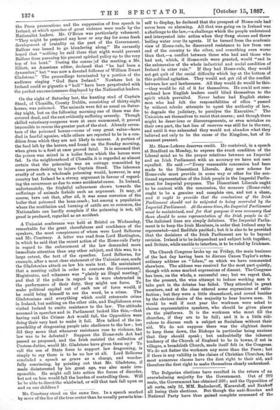The Church Congress broke up on Friday, the main business
of the last day having been to discuss Canon Taylor's extra- ordinary address on "Islam," on which we have commented elsewhere. The address was received for the most part quietly, though with some marked expressions of dissent. The Congress has been, on the whole, a successful one; but we regret that, for the present, the wise attempt to induce working men k take part in the debates has failed. They attended in great numbers, and at the close uttered some expressions of satis- faction; but they were a little shamefaced, and cowed besides by the obvious desire of the majority to hear known men. It would be well if next year the workmen were asked to choose representative speakers, who should be given places on the platforms. It is the workmen who must fill the churches, if they are to be full; and it is a little ridi- culous to discuss such a subject as Socialism without their aid. We do not suppose there was the slightest desire to keep them down, the Bishops in partioular being anxious that they should speak ; but undoubtedly the inherent tendency of the Church of England to be in towns, if not in villages, a broadcloth Church, made itself felt in the Congress. We do not flatter the workmen any more than the Peers ; but if there is any validity in the claims of Christian Churches, the most numerous classes have the first right to their aid, and therefore the first right to make themselves clearly understood.


































 Previous page
Previous page